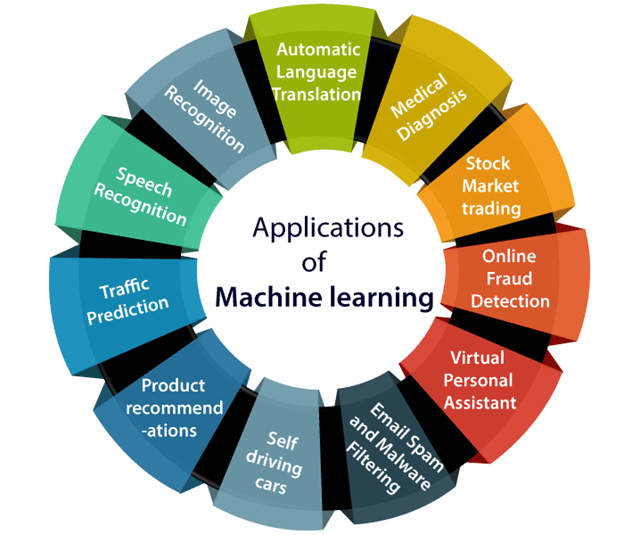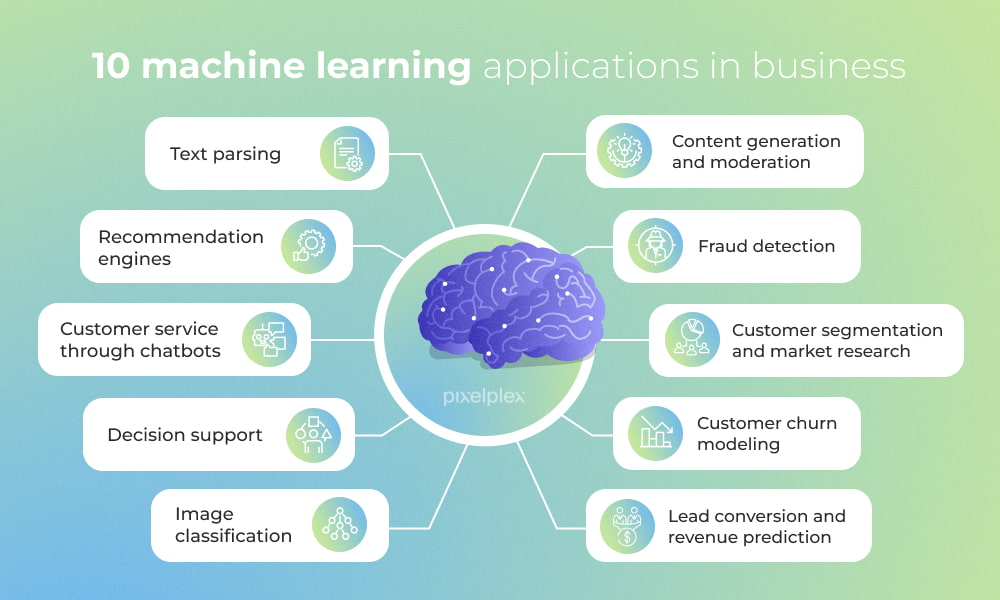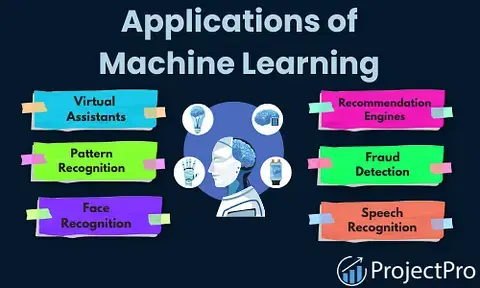Machine learning applications include image recognition, natural language processing, and predictive analytics. These technologies enhance automation and decision-making across various industries.
Machine learning has revolutionized many sectors by enabling systems to learn from data and improve over time. In healthcare, it aids in diagnosing diseases and personalizing treatments. The finance industry benefits from fraud detection and risk management. Retailers use it for customer recommendations and inventory management.
Autonomous vehicles rely on machine learning for navigation and safety. In the entertainment industry, algorithms suggest content based on user preferences. These applications highlight the transformative power of machine learning, making processes more efficient and intelligent. The technology continues to evolve, promising even more innovative solutions in the future.
Introduction To Machine Learning In Industry
Machine learning (ML) is transforming industries across the globe. Its applications are diverse and impactful. From healthcare to retail, machine learning optimizes operations and enhances decision-making. By analyzing data patterns, ML provides insights that drive innovation and efficiency.
The Rise Of Smart Technology
Smart technology is reshaping how industries operate. Devices and systems are getting smarter. They can learn from data and adapt to changes. This shift is powered by machine learning algorithms.
Companies use smart technology to improve products and services. For example, smart thermostats learn user preferences for better energy management. Predictive maintenance uses ML to foresee equipment failures, reducing downtime and costs.
| Industry | Smart Technology Application |
|---|---|
| Healthcare | Personalized treatment plans |
| Retail | Customer behavior analysis |
| Manufacturing | Automated quality control |
Transforming Business Models
Machine learning is changing business models. It helps companies make data-driven decisions. Businesses can predict trends and customer needs. This leads to innovative products and services.
ML algorithms can optimize supply chains. They predict demand and manage inventory efficiently. This reduces waste and increases profitability. Personalized marketing strategies are another benefit. Businesses target customers with tailored offers, improving engagement and sales.
- Enhanced customer experience
- Increased operational efficiency
- Data-driven decision-making
These transformations are crucial for staying competitive. Companies embracing ML gain significant advantages. They lead their industries with smarter, more efficient operations.
Healthcare: Predictive Diagnostics And Personalized Treatment
Machine learning is transforming healthcare. It helps doctors predict diseases. It also helps create personalized treatments for patients. This technology can save lives and improve quality of life. Let’s explore some applications.
Improving Patient Outcomes
Machine learning helps predict diseases early. Early diagnosis can save lives. Algorithms analyze patient data. They find patterns that humans might miss. This helps doctors make better decisions.
For example, AI can predict heart disease. It uses data from patient records. Early warnings can prompt lifestyle changes. This reduces the risk of heart attacks.
Machine learning also helps manage chronic diseases. Algorithms monitor patient data continuously. They alert doctors to any changes. This ensures timely intervention.
Streamlining Drug Development
Drug development is a long process. Machine learning makes it faster. Algorithms analyze vast amounts of data. This helps identify potential drug candidates quickly.
AI can predict drug effectiveness. It uses data from clinical trials. This reduces the need for lengthy tests. It also cuts costs.
Machine learning also helps in personalized medicine. It analyzes genetic data. This helps create treatments tailored to individual patients. It improves effectiveness and reduces side effects.
| Area | Application |
|---|---|
| Predictive Diagnostics | Early disease detection |
| Chronic Disease Management | Continuous patient monitoring |
| Drug Development | Faster and cheaper drug discovery |
| Personalized Medicine | Treatments tailored to individual patients |
Machine learning is changing healthcare. It improves patient outcomes and speeds up drug development. It also helps create personalized treatments. This technology is a game-changer.
Finance: Fraud Detection And Algorithmic Trading
Machine Learning (ML) revolutionizes finance. It improves fraud detection and boosts algorithmic trading. This tech ensures safer transactions and smarter investments. Below, explore how ML impacts finance.
Securing Transactions
Fraud detection is crucial in finance. Machine Learning helps in identifying suspicious activities quickly. It monitors transactions in real-time. This process uses various algorithms to flag unusual patterns.
| Method | Purpose |
|---|---|
| Supervised Learning | Identifies known fraud patterns |
| Unsupervised Learning | Detects unknown anomalies |
Financial institutions rely on these methods. They reduce the risk of fraudulent transactions. They also protect customer data and assets. This boosts customer trust and confidence.
Data-driven Investment Strategies
Algorithmic trading uses ML to make investment decisions. It analyzes large datasets to find profitable opportunities. This process is faster than human analysis.
- Pattern Recognition: Identifies market trends.
- Predictive Analysis: Forecasts future stock prices.
- Automated Trades: Executes transactions instantly.
These strategies enhance investment returns. They also minimize human errors. ML ensures decisions are based on data, not emotions.
Investors benefit from these advancements. They receive more accurate market insights. This allows for better financial planning and investment choices.
Automotive: Autonomous Vehicles And Predictive Maintenance
Machine learning is transforming the automotive industry. It powers autonomous vehicles and improves vehicle longevity through predictive maintenance. These advancements offer safer, more efficient, and reliable transportation solutions.
The Road To Self-driving Cars
Self-driving cars use machine learning to navigate roads safely. They rely on sensors and cameras to understand their surroundings. Algorithms analyze this data to make driving decisions. This includes braking, accelerating, and steering.
There are different levels of vehicle automation:
- Level 1: Driver assistance like cruise control.
- Level 2: Partial automation, hands-off steering.
- Level 3: Conditional automation, eyes off the road.
- Level 4: High automation, no driver needed in some conditions.
- Level 5: Full automation, no human intervention.
Self-driving cars aim to reduce accidents caused by human error. They also improve traffic flow and reduce congestion.
Enhancing Vehicle Longevity
Predictive maintenance uses machine learning to predict vehicle issues before they occur. This helps in avoiding unexpected breakdowns and costly repairs. Sensors in cars collect data about engine performance, oil levels, and tire pressure.
This data is then analyzed to predict potential failures. Drivers receive alerts to service their vehicles in time. This proactive approach ensures vehicles last longer and perform better.
Benefits of predictive maintenance include:
- Reduced maintenance costs
- Increased vehicle uptime
- Enhanced safety
With these advancements, machine learning is revolutionizing the automotive sector. It makes vehicles safer, more reliable, and longer-lasting.
Retail: Customer Experience And Inventory Management
Machine Learning (ML) is transforming the retail industry. It enhances customer experience and optimizes inventory management. Retailers can now predict customer behavior and reduce waste. Let’s explore how ML achieves these goals.
Personalizing Shopping
ML algorithms analyze customer data to create personalized shopping experiences. By understanding preferences, retailers can offer tailored recommendations. This increases customer satisfaction and sales.
For example, an e-commerce site can suggest products based on past purchases. This makes shopping easier and more enjoyable.
Optimizing Supply Chains
ML helps in managing supply chains efficiently. It predicts demand and avoids stockouts or overstock situations. By analyzing data, retailers can balance supply and demand. This reduces costs and improves customer satisfaction.
Consider the following benefits of ML in supply chain management:
- Demand Forecasting: Predicts future sales accurately.
- Inventory Optimization: Maintains the right stock levels.
- Logistics Planning: Enhances delivery efficiency.
| ML Application | Benefit |
|---|---|
| Personalized Recommendations | Increased Sales |
| Demand Forecasting | Reduced Stockouts |
| Inventory Optimization | Lower Costs |
In summary, ML is a game-changer for retail. It improves customer experiences and streamlines inventory management. Retailers can stay competitive and meet customer needs effectively.
Manufacturing: Quality Control And Efficient Production
Machine learning is revolutionizing the manufacturing industry. It enhances quality control and boosts efficient production. This technology helps in predicting defects and optimizing workflows. Let’s explore how machine learning is transforming manufacturing.
Minimizing Defects
Machine learning algorithms detect defects early. This reduces waste and saves costs. Sensors collect data from production lines. The data gets analyzed in real-time. Algorithms identify patterns that indicate potential defects.
Early detection leads to timely interventions. This minimizes defective products reaching customers. Consistent quality improves customer satisfaction and brand reputation.
| Defect Type | Detection Method | Outcome |
|---|---|---|
| Surface Imperfections | Image Recognition | Reduced Scraps |
| Assembly Errors | Sensor Data Analysis | Lower Rework Costs |
Smart Factory Solutions
Smart factories use machine learning for efficient operations. These factories have interconnected devices. They collect and share data continuously.
Machine learning optimizes production schedules. It predicts maintenance needs and reduces downtime. This ensures smooth and efficient production.
Key benefits of smart factories include:
- Enhanced productivity
- Better resource management
- Improved safety standards
Smart factory solutions drive the future of manufacturing. They ensure high-quality products and efficient processes.
Agriculture: Crop Monitoring And Precision Farming
Machine learning is transforming agriculture. Farmers can now monitor crops in real-time. This helps in making informed decisions. Precision farming ensures optimal use of resources.
Increasing Yield Predictability
Farmers can predict crop yields accurately using machine learning. This helps in planning and resource allocation. They can use weather data and soil conditions. Historical data improves the prediction models. This reduces the risk of crop failure.
Here are some ways machine learning increases yield predictability:
- Weather Forecasting: Predicts weather patterns accurately.
- Soil Analysis: Determines soil quality and nutrient levels.
- Pest Detection: Identifies pest infestations early.
- Crop Health Monitoring: Monitors plant health using sensors.
Sustainable Practices
Machine learning promotes sustainable farming practices. It helps in reducing chemical use. Farmers can optimize water usage. This reduces environmental impact. It also improves soil health.
Here are some sustainable practices enabled by machine learning:
- Precision Irrigation: Supplies water only where needed.
- Targeted Fertilization: Applies fertilizers based on soil needs.
- Integrated Pest Management: Uses natural predators to control pests.
- Crop Rotation Planning: Suggests optimal crop rotation schedules.
| Machine Learning Application | Benefit |
|---|---|
| Yield Prediction | Improves crop planning and resource allocation |
| Soil Analysis | Enhances soil health and fertility |
| Pest Detection | Reduces crop loss from pests |
| Precision Irrigation | Optimizes water usage |

Credit: www.javatpoint.com
Entertainment: Content Creation And Recommendation Systems
Machine learning is transforming the entertainment industry. It helps create content and recommends it to users. This technology makes entertainment more engaging and personalized.
Tailoring User Experiences
Recommendation systems use machine learning to suggest content. They analyze user behavior and preferences. This helps in providing personalized recommendations.
Streaming services like Netflix and Spotify use these systems. They study what users watch or listen to. Then, they suggest similar content.
These systems improve user satisfaction. They reduce the time spent searching for new content. Below is a table showing benefits:
| Benefit | Description |
|---|---|
| Personalization | Custom content based on user interests. |
| Time-saving | Less time spent searching for new content. |
| User Engagement | Higher engagement due to relevant suggestions. |
Innovating Media Production
Machine learning also aids in media production. It can create content like music and art. AI tools help artists and creators with new ideas.
For example, AI can generate music based on certain styles. It can also help in writing scripts for movies and shows. This speeds up the creative process.
Below are some key areas:
- Music Creation: AI generates melodies and harmonies.
- Script Writing: AI suggests plot ideas and dialogues.
- Visual Art: AI creates unique artwork.
These advancements make content creation faster and more innovative. They open new possibilities in the entertainment industry.
Energy Sector: Smart Grids And Renewable Energy Optimization
The energy sector is undergoing a transformation. Machine learning is at the heart of this change. Smart grids and renewable energy optimization are key areas of focus. These technologies make our power supply more reliable and greener.
Stabilizing Power Supply
Smart grids help stabilize the power supply. They use sensors and data analytics. This helps prevent blackouts and manage demand.
Machine learning predicts energy needs. It adjusts the supply in real-time. This keeps the grid stable and efficient.
| Feature | Benefit |
|---|---|
| Real-time Monitoring | Prevents blackouts |
| Demand Forecasting | Optimizes energy use |
| Automated Control | Increases efficiency |
Maximizing Green Energy Use
Machine learning helps maximize green energy use. It predicts weather patterns. This helps in managing solar and wind energy.
Energy storage is also optimized. Machine learning decides the best times to store and use energy. This makes renewable energy more reliable.
- Solar energy prediction
- Wind energy management
- Optimal energy storage
Smart grids and machine learning make the energy sector smarter. They help use more renewable energy. They make the power supply stable and green.
Challenges And Ethical Considerations
Machine learning has revolutionized many industries. Yet, it comes with unique challenges and ethical considerations. Understanding these issues is vital for responsible development and deployment. This section delves into key areas of concern.
Addressing Bias And Privacy
One major challenge in machine learning is addressing bias. Algorithms can inherit biases from their training data. This can lead to unfair outcomes.
To combat this, developers need to use diverse datasets. Regular audits can also help identify and mitigate biases. Transparency in algorithm design is crucial.
Privacy is another critical concern. Machine learning systems often require vast amounts of data. Ensuring this data is secure is essential.
Data anonymization techniques can protect user privacy. Also, developers should limit data collection to what is necessary. Clear privacy policies should inform users about data usage.
Regulatory Compliance
Machine learning applications must adhere to regulatory standards. These rules ensure safety, fairness, and transparency.
Various regions have specific regulations. For instance, the GDPR in Europe focuses on data protection. In the U.S., the CCPA provides similar guidelines.
Compliance involves regular updates to stay current with changing laws. Developers should also document their processes for accountability. This ensures that the systems remain legal and ethical.
| Challenge | Solution |
|---|---|
| Bias in Algorithms | Use diverse datasets and conduct regular audits |
| Privacy Concerns | Implement data anonymization and limit data collection |
| Regulatory Compliance | Stay updated with laws and document processes |
Addressing these challenges ensures that machine learning remains a force for good. Proper measures can mitigate risks, making systems more reliable and ethical.
Future Prospects Of Machine Learning
Machine learning (ML) is revolutionizing various fields. Its future prospects are vast and promising. With advancements in technology, ML continues to grow rapidly. The potential impacts on society are substantial and far-reaching.
Emerging Technologies
Machine learning integrates with many emerging technologies. These technologies include quantum computing, IoT, and edge computing. Quantum computing enhances ML’s processing power. This results in faster and more accurate predictions.
IoT devices collect vast amounts of data. ML processes this data to provide insights. Edge computing allows ML to process data closer to its source. This reduces latency and increases efficiency.
Combining ML with these technologies creates new opportunities. These opportunities lead to innovative solutions across various sectors.
Potential For Societal Impact
ML has the potential to transform society. It can improve healthcare, education, and transportation. In healthcare, ML aids in early disease detection. This leads to better patient outcomes.
In education, ML personalizes learning experiences. This helps students learn more effectively. Transportation benefits from ML through self-driving cars. These cars promise safer and more efficient travel.
ML also has environmental applications. It helps monitor and reduce pollution. This contributes to a healthier planet. The societal impact of ML is both profound and promising.

Credit: pixelplex.io

Credit: www.projectpro.io
Frequently Asked Questions
What Is The Application Of Machine Learning?
Machine learning is used in various applications, including image and speech recognition, predictive analytics, recommendation systems, and autonomous vehicles. It enhances decision-making, automates tasks, and improves personalized user experiences across industries like healthcare, finance, retail, and technology.
What Is Machine Learning Used For In Real Life?
Machine learning is used for image recognition, fraud detection, personalized recommendations, autonomous vehicles, and predictive maintenance. It enhances healthcare diagnostics, improves customer service with chatbots, and optimizes supply chain management.
What Is The Difference Between Ai And Ml?
AI, or Artificial Intelligence, is a broader concept of machines mimicking human intelligence. Machine Learning (ML) is a subset of AI, focused on algorithms learning from data. AI includes ML, but ML specifically involves learning and improving from experience without explicit programming.
What Is Ml With An Example?
Machine Learning (ML) is a subset of AI that enables systems to learn from data. For example, email filters use ML to sort spam.
Conclusion
Machine learning is transforming various industries, making processes efficient and intelligent. Its applications are vast and growing daily. Businesses should explore these technologies to stay competitive. Embracing machine learning can lead to significant advancements and innovation. Stay informed and harness its potential for future growth.



